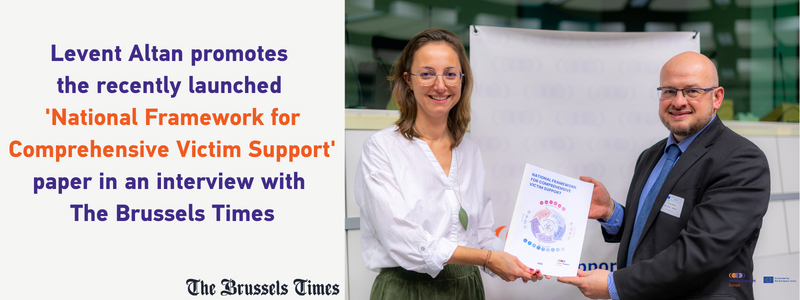Mass Casualty Commission’s roundtable discussions on needs of first responders, families and communities in the aftermath of mass casualty incidents

 The Mass Casualty Commission is an independent public inquiry created to examine the April 18 – 19, 2020 mass casualty event in Nova Scotia, and to provide meaningful recommendations to ensure the safety of Canadian communities. On 21 October, 2020 the Government of Canada and the Province of Nova Scotia each issued an Order in Council (OIC), officially establishing the Commission, and announcing the appointment of three Commissioners and the start of the Commission’s work.
The Mass Casualty Commission is an independent public inquiry created to examine the April 18 – 19, 2020 mass casualty event in Nova Scotia, and to provide meaningful recommendations to ensure the safety of Canadian communities. On 21 October, 2020 the Government of Canada and the Province of Nova Scotia each issued an Order in Council (OIC), officially establishing the Commission, and announcing the appointment of three Commissioners and the start of the Commission’s work.
During the inquiry – and as part of their investigation – the Commissioners will listen, ask questions, and gather information. In November 2022, when their mandate ends, the Commissioners will submit a report on their findings, lessons learned, and recommendations that may prevent – and respond to – similar events.
The Mass Casualty Commission has organised roundtables that involve experts and knowledgeable individuals who can offer appropriate informed insight through public, facilitated discussions. These roundtables will provide an opportunity to learn more about why, and how various aspects of, the mass casualty event occurred.
We would like to draw attention to the agendas and recordings of two roundtable events that took place in June and which focused on (1) the needs of first responders during mass casualty incidents and (2) the needs of family and community members after mass casualty incidents.
Roundtable: Needs of first responders after mass casualty incidents
The first roundtable in this series reflected on the needs of first responders after mass casualty incidents. In this session, roundtable participants addressed the following core themes:
- The immediate, short- and long-term needs of first and secondary responders exposed to traumatic situations by virtue of their jobs;
- Best practices for addressing the needs identified above;
- Models that provide support, promote healing and foster resiliency.
Various speakers from different backgrounds participated in the discussion:
- Facilitator: Krista Smith, Legal Policy Officer, Research and Policy Team, Mass Casualty Commission
- Dr. Arija Birze, Senior Research Associate, Institute for Better Health, Trillium Health Partners, Ontario. Dr. Birze is a Senior Research Associate at the Institute for Better Health, Trillium Health Partners. Her postdoctoral work, completed at the University of Toronto’s Factor-Inwentash Faculty of Social Work, explores the traumatic impact of violent video evidence on criminal justice professionals. Her PhD, completed at the Dalla Lana School of Public Health, University of Toronto, examined gender and work as social determinants of health, with a focus on occupational stress and traumatic exposure on Police Communicators, including 911 call-takers and dispatchers.
- Robin Campbell is a PhD Candidate at Dalhousie University, Nova Scotia; her research is focused on the mental health of volunteer firefighters in rural Nova Scotia. Ms. Campbell is a former volunteer firefighter with Wolfville and Greenwich Fire Departments. She is also an adjunct Professor at Acadia University, an Associate Researcher with FIREWELL and a Reservist with the Canadian Armed Forces.
- Dr. Julie MacMillan-Devlin, former Program Evaluation Officer of the Operational Stress Injury Clinic in Fredericton, New Brunswick and manager of Psychological Services with the Ontario Provincial Police.
- Mary Fetchet, President and Executive Director of Voices Center for Resilience, an organization she founded following the death of her 24 year-old son on 9/11. A graduate of Columbia University School of Social Work, her 29 years of experience as a clinical social worker influenced VOICES, an innovative approach to providing long-term support for victims’ families, responders and survivors, and commemorating the lives lost in a meaningful way
- Dr. Alexandra Heber, Associate Professor, Department of Psychiatry and Behavioural Neurosciences at McMaster University, Ontario. Dr. Heber has over 35 years of experience working in mental health. After a decade working with HIV+ clients and leading an Assertive Community Treatment Team in Toronto, she enrolled in the Canadian Armed Forces in 2006, and deployed to Afghanistan in 2009-10. In 2016, she became inaugural Chief of Psychiatry for Veterans Affairs Canada.
- Dr. Megan McElheran, CEO & Chief Clinical Psychologist, Wayfound Mental Health Group, Alberta. Dr. McElheran works exclusively with military staff and public safety personnel, including members of the Royal Canadian Mounted Police, municipal police officers, firefighters, corrections officers, medical personnel, and those who are directly or vicariously impacted by traumatic events.
- Dr. Deborah Norris, Professor, Department of Family Studies and Gerontology at Mount Saint Vincent University, Nova Scotia. With a background in family science, critical theories, and qualitative methodology, Dr. Norris teaches courses in family relations, family violence, and research methods. Her research program focuses on the bi-directional relationship between operational stress injuries and the mental health and well-being of military and veteran families and those of public safety personnel.
To access the event’s recording, please click here.
Roundtable: Needs of family and community members after mass casualty incidents
This discussion focused on the needs of family and community members after mass casualty incidents, thereby reflecting on the following care themes:
- The immediate, short- and long-term needs of those impacted by a mass casualty event with particular attention given to the needs of the victims’ families and members of communities closely connected to a mass casualty incident;
- Best practices for addressing those needs; and
- Models that support grief, promote healing and foster resiliency.
The roundtable members consisted of these inspiring speakers:
- Facilitator: Dr. Emma Cunliffe, Research and Policy Director, Mass Casualty Commission
- Dr. Grete Dyb, Adjunct Professor at the Institute of Clinical Medicine at the University of Oslo; co-author of Expert Report: Survivors and the Aftermath of the Terrorist Attack on Utøya Island, Norway. Grete Dyb is an adjunct professor at the University of Oslo’s Faculty of Medicine and is Head of Research at the Norwegian Centre for Violence and Traumatic Stress Studies, Oslo, Norway. She has been Principal Investigator for numerous studies on childhood trauma and PTSD in children and adolescents and is past president of the International Society of Traumatic Stress Studies. After the 2011 terrorist attack in Norway, she initiated the Utøya Study, a longitudinal interview study of survivors and their parents.
- Dr. Jaclyn Schildkraut, Associate Professor of Criminal Justice at the State University of New York at Oswego; author of Expert Report: Supporting Survivors and Communities after Mass Shootings. Dr. Schildkraut holds a PhD in Criminal Justice from the Texas State University in San Marcos. A national expert on mass shootings, Dr. Schildkraut’s research has been featured by local, national, and international media.
- Levent Altan, Executive Director of Victim Support Europe, Brussels, Belgium. Under Mr. Altan’s leadership, VSE has grown into an international network of victim support organisations which carries out advocacy, policy development, and capacity building for all victims of crime.
- Mary Fetchet, President and Executive Director of Voices Center for Resilience, an organization she founded following the death of her 24 year-old son on 9/11. A graduate of Columbia University School of Social Work, her 29 years of experience as a clinical social worker influenced VOICES, an innovative approach to providing long-term support for victims’ families, responders and survivors, and commemorating the lives lost in a meaningful way.
- Serena Lewis, former Northern Zone Grief Coordinator and Provincial Grief Consultant, Nova Scotia. Ms. Lewis is a registered social worker and holds both a bachelor’s and a master’s degree in Social Work. Since she completed her term with the Nova Scotia National Health Authority, she has continued consulting with teams and groups supporting death and grief literacy as well as psychological safety. She lives and works on the unceded territory of the Mi’kmaq, calling Great Village her home.
- Dr. Megan McElheran, CEO of Wayfound Mental Health Group and Clinical Psychologist, Alberta. Dr. McElheran works exclusively with military staff and public safety personnel, including members of the Royal Canadian Mounted Police, municipal police officers, firefighters, corrections officers, medical personnel, and those who are directly or vicariously impacted by traumatic events.
- Dr. Terry Mitchell, Clinical and Community Psychologist. Dr. Mitchell was the principal investigator on a study into the impact on volunteer first responders and local communities following the Swiss Flight 111 disaster in 1998. She is Professor Emeritus, Wilfrid Laurier University, Ontario and now works as a clinical psychologist in private practice, PEI.
To access the event’s recording, please click here.
Recommend0 recommendationsPublished in Uncategorised


